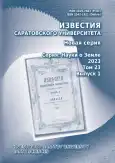Assessment of future Central African air temperatures under the CMIP5 and CMIP6 project scenarios
- Авторлар: Mami M.T.1, Lobanov V.A.1, Korotkova N.V.2
-
Мекемелер:
- Russian State Hudrometeorological University
- Saratov State University
- Шығарылым: Том 23, № 1 (2023)
- Беттер: 8-20
- Бөлім: Articles
- URL: https://bakhtiniada.ru/1819-7663/article/view/250869
- DOI: https://doi.org/10.18500/1819-7663-2023-23-1-8-20
- ID: 250869
Дәйексөз келтіру
Толық мәтін
Аннотация
Негізгі сөздер
Авторлар туралы
Magbini Mami
Russian State Hudrometeorological University79 Voronezhskaya St., St. Petersburg 192007, Russia
Vladimir Lobanov
Russian State Hudrometeorological University79 Voronezhskaya St., St. Petersburg 192007, Russia
Nadezhda Korotkova
Saratov State University83, Astrakhanskaya Str., Saratov, 410012, Russia
Әдебиет тізімі
- Salman S. A., Shahid S., Afan H. A., Shiru M. S., AlAnsari N., Yaseen Z. M. Changes in climatic water availability and crop water demand for Iraq region // Sustainability. 2020. Vol. 12. P. 3437. https://doi.org/10.3390/su12083437
- Nashwan M. S., Shahid S. Future precipitation changes in Egypt under the 1.5 and 2.0°C global warming goals using CMIP6 multimodel ensemble // Atmospheric Research. 2022. Vol. 265. Article number 105908. https://doi.org/10.1016/j.atmosres.2021.105908
- Hamed M. M., Nashwan M. S., Shahid S. A novel selection method of CMIP6 GCMs for robust climate projection // International Journal of Climatology. 2022. Vol. 42. P. 4258– 4272. https://doi.org/10.1002/joc.7461
- Salehie O.; Ismail T. B., Hamed M. M., Shahid S., Idlan Muhammad M. K. Projection of Hot and Cold Extremes in the Amu River Basin of Central Asia using GCMs CMIP6 // Stochastic Environmental Research and Risk Assessment. 2022. Vol. 36, iss. 10. P. 1–22. https://doi.org/10.1007/s00477-022-02201-6
- Salehie O., Ismail T. B., Hamed M. M., Shahid S., Idlan Muhammad M. K. Selection of CMIP6 GCM with projection of climate over the Amu Darya River Basin // Theoretical and Applied Climatology. 2022. № 2. P. 1–19. https://doi.org/10.21203/rs.3.rs-1031530/v1
- Hartmann D. L. Chapter 11-Global Climate Models // Global physical climatology. 2nd ed. Boston : Elsevier, 2016. P. 325–360.
- Taylor K. E., Balaji V., Hankin S., Juckes M., Lawrence B., Pascoe S. CMIP5 data reference syntax (DRS) and controlled vocabularies. PCMDI: San Francisco Bay Area, 2011. https://pcmdi.llnl.gov/mips/cmip5/docs/cmip5_data_reference_syntax_v1-01... (дата обращения: 10.05.2022).
- Hamed M. M., Nashwan M. S., Shahid S., Ismail T. B., Wang X. J., Dewan A., Asaduzzaman M. Inconsistency in historical simulations and future projections of temperature and rainfall: A comparison of CMIP5 and CMIP6 models over Southeast Asia // Atmospheric Research. 2022. Vol. 265. P. 105927. https://doi.org/10.1016/j.atmosres.2021.105927
- Weigel A. P., Knutti R., Liniger M. A., Appenzeller C. Risks of model weighting in multimodel climate projections // Journal of Climate. 2010. Vol. 23. P. 4175–4191. https://doi.org/10.1175/2010JCLI3594.1
- Hamed M. M., Nashwan M. S., Shahid S. Inter-comparison of Historical Simulation and Future Projection of Rainfall and Temperature by CMIP5 and CMIP6 GCMs Over Egypt // International Journal of Climatology. 2022. Vol. 42. P. 4316– 4332. https://doi.org/10.1002/joc.7468
- Song Y. H., Nashwan M. S., Chung E. S., Shahid S. Advances in CMIP6 INM-CM5 over CMIP5 INM-CM4 for precipitation simulation in South Korea // Atmospheric Research. 2021. Vol. 247. Article number 105261. https://doi.org/10.1016/j.atmosres.2020.105261
- Eyring V., Bony S., Meehl G. A., Senior C. A., Stevens B., Stouffer R. J., Taylor K. E. Overview of the Coupled Model Intercomparison Project Phase 6 (CMIP6) experimental design and organization // Geoscientific Model Development. 2016. Vol. 9. P. 1937–1958. https://doi.org/10.5194/gmd-9-1937-2016
- Shiru M. S., Chung E. S., Shahid S., Wang X.-J. Comparison of precipitation projections of CMIP5 and CMIP6 global climate models over Yulin China // Theoretical and Applied Climatology. 2022. Vol. 147. P. 535–548. https://doi.org/10.21203/rs.3.rs-628014/v1
- Song Y. H., Chung E. S., Shahid S. Spatiotemporal differences and uncertainties in projections of precipitation and temperature in South Korea from CMIP6 and CMIP5 general circulation models // International Journal of Climatology. 2021. Vol. 41. P. 5899–5919. https://doi.org/10.1002/joc.7159
- Ortega G., Arias P. A., Villegas J. C., Marquet P. A., Nobre P. Present-day and future climate over central and South America according to CMIP5/CMIP6 models // International Journal of Climatology. 2021. Vol. 41. P. 6713–6735. https://doi.org/10.1002/joc.7221
- Zamani Y., Hashemi Monfared S. A., Azhdari Moghaddam M., Hamidianpour M. A comparison of CMIP6 and CMIP5 projections for precipitation to observational data: The case of Northeastern Iran // Theoretical and Applied Climatology. 2020. Vol. 142. P. 1613–1623. https://doi.org/10.1007/s00704-020-03406-x
- Chen C.-A., Hsu H.-H., Liang H.-C. Evaluation and comparison of CMIP6 and CMIP5 model performance in simulating the seasonal extreme precipitation in the Western North Pacific and East Asia // Weather and Climate Extremes 2021. Vol. 31. Article number 100303. https://doi.org/10.1016/j.wace.2021.100303
- Ayugi B., Jiang Z., Zhu H., Ngoma H., Babaousmail H., Karim R., Dike V. Comparison of CMIP6 and CMIP5 models insimulating mean and extreme precipitation over East Africa // International Journal of Climatology. 2021. Vol. 41. P. 6474– 6496. https://doi.org/10.1002/joc.7207
- Bourdeau-Goulet S. C., Hassanzadeh E. Comparisons Between CMIP5 and CMIP6 Models: Simulations of Climate Indices Influencing Food Security, Infrastructure Resilience, and Human Health in Canada // Earth’s Future. 2021. Vol. 9. Article number e2021EF001995. https://doi.org/10.1029/2021EF001995
- Lun Y., Liu L., Cheng L., Li X., Li H., Xu Z. Assessment of GCMs simulation performance for precipitation and temperature from CMIP5 to CMIP6 over the Tibetan Plateau // International Journal of Climatology. 2021. Vol. 41. P. 3994– 4018. https://doi.org/10.1002/joc.7055
- Наука и инновации – современные концепции: сборник научных статей по итогам работы Международного научного форума / ответственный редактор Д. Р. Хисматуллин. Москва : Инфинити, 2022. 236 с.
- Лобанов В. А., Кириллина К. С. Современные и будущие изменения климата Республики Саха (Якутия). СанктПетербург : Издательство РГГМУ, 2019. 157 с.
Қосымша файлдар









